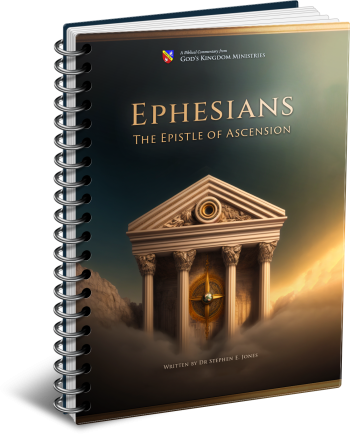Latest Posts
View the latest posts in an easy-to-read list format, with filtering options.

Paul's epistle to the Ephesians is, in some ways, a continuation of his epistle to the Romans. It enlarges upon Romans 1-8 in regard to the believer's position and right standing with God. We are "seated" with Christ, so we must "walk" according to our calling, and "stand" in the full armor of God against those who would oppose us.
Category - Bible Commentaries

Paul’s primary calling was to define and explain in greater detail the meaning and scope of “all things” that God promised to reconcile, according to Psalm 8:6, “You have put all things under His feet.” His teaching had a great impact on the early church, building the church on the foundation of an Impartial God who treated all believers as equals, not allowing Jews to be “chosen” on account of their genealogy. Likewise, he established the universal scope of reconciliation to God, where all of creation and all of humanity would ultimately be subject to Christ and serve God.
Paul taught that creation would achieve its original calling and purpose, after a long season of being at enmity with God. After the final age of judgment, sin and death would be abolished, putting an end to the dualistic world and its war between good and evil. Paul’s teaching ran contrary to the Greeks around him, who believed that everlasting dualism was built into the very fabric of the universe and that the final solution was the separation of light from darkness. The Greeks thus believed that both good and evil were eternal and that universal reconciliation could never be achieved.
For this reason, as Paul confronted Greek religion, it was necessary for him (as an apostle) to build a proper “foundation” (Eph. 2:20) for the final temple that God was constructing. He and the other apostles built the church not only on the corner stone of Christ but on the foundation of the first principles in Genesis 1 and 2.
It was built upon the rights and responsibilities of the Creator, based on Gen. 1:1. It was built upon the fact that man had been given authority (not sovereignty) over all things (Gen. 1:26). Although Adam sinned and failed in his commission, Christ, the “Son of Man” came as Adam’s Successor to succeed where Adam failed (Rom. 5:12-19).
Paul’s teaching on universal reconciliation was central to the Alexandrian school of thought, established by the apostle Thomas. When Thomas later went to India to preach the gospel, he left the school in the hands of a disciple named Pantaenus. The Ante-Nicene Fathers, Vol. VI, page 3 says,
“Alexandria continues to be the head of Christian learning… We have already observed the continuity of the great Alexandrian school; how it arose, and how Pantaenus begat Clement, and Clement begat Origen. So Origen begat Gregory, and so the Lord has provided for the spiritual generation of the Church teachers, age after age, from the beginning. Truly, the Lord gave to Origen a holy seed, better than natural sons and daughters.”
In the first half of the third century, Origen took up Paul’s mantle in his own way, and his writings on First Principles made him the greatest theologian and writer of his day. A century later, the greatest theologians of the church continued to draw from Paul’s teachings on the reconciliation of all things. Gregory of Nyassa was among these great teachers, along with Basil, his brother, who was the founder of monasteries.
Gregory of Nazianzen was another prominent and highly respected bishop, whose Great Catechism was widely used throughout the church. After his death, he was given the title, “Theologian,” which up to that time had been a title reserved only for the Apostle John, and in 787 the church leaders at a Council granted him the title, “Father of Fathers.”
These all taught universal reconciliation, based upon Paul’s earlier teachings, and we may note that these men were never condemned as heretics but honored as some of the most prominent theologians of the early church. It was only after their time—in the year 400 A.D.—that the teaching of universal reconciliation began to be condemned by Rome. It took centuries to stamp out Paul’s teaching, but the effects of the new teaching on everlasting punishment contributed greatly to the re-establishment of Old Covenant mindsets in the church.
The rise of the Protestants in the 1500’s did not immediately enlighten them in regard to the foundation of universal reconciliation. It was not until the 1840’s that we find the first book written about this. Even then, the Roman Church’s label of heresy continued to prevail in most of the Protestant denominations to the present time. Yet the dirty little secret in Christian seminaries today is that the truth of universal reconciliation dominated the early church until the year 400 when it was finally opposed by corrupt men.
For more information, see A Short History of Universal Reconciliation.
As we saw earlier, Paul wrote in Eph. 3:10 about “the manifold wisdom of God,” which was seen in the laws of the Impartial God who had broken down the dividing wall and had established equal rights among the believers. Eph. 3:11, 12 says,
11 This was in accordance with the eternal [aionian] purpose which He carried out in Christ Jesus our Lord, 12 in whom we have boldness and confident access through faith in Him.
The Emphatic Diaglott, a more literal translation, reads:
11 according to a Plan of the Ages, which he formed for the Anointed Jesus our Lord, 12 by whom we have this freedom of speech and access with confidence through the faith of Him.
The “eternal purpose” (NASB) is better understood as God’s “Plan of the Ages.” The Greek word aionian pertains to an eon, or age. More important, it is the Greek equivalent of the Hebrew word olam, which literally means “hidden.” (Its root is alam, “to hide.”) Hence, God’s Plan of the Ages implies that it has been hidden in past ages. Recall that Paul tells us in Eph. 3:5 that Paul was revealing God’s plan “which, in other generations was not made known to the sons of men.” In other words, it was hidden.
Again, recall that Paul wrote in Eph. 3:9,
9 and to bring to light what is the administration of the mystery which for ages [aionon] has been hidden in God who created all things.
In essence, Paul was using a play on the Hebrew word olam, “hidden,” which was being expressed in the Greek word aionon. This shows conclusively that Paul was thinking in Hebrew, though he wrote in Greek.
Secondly, we should note that our “freedom of speech and access with confidence” is based on Christ’s faith, not our faith. The NASB reads, “through faith IN Him,” but The Emphatic Diaglott correctly renders it “through the faith OF Him,” that is, of Christ. It was Christ’s faith that took Him to the cross, which penetrated the veil and gave us access to God.
There are other passages, such as Gal. 3:26, which speak about our own “faith IN Christ Jesus.” I do not mean to minimize the need for our own faith. However, in Eph. 3:12, Paul was emphasizing the faith of Christ, not our own faith. We need to see the importance of His faith as well as ours, because His faith is rooted in God’s sovereignty.
Eph. 3:13 says,
13 Therefore I ask you not to lose heart at my tribulations on your behalf, for they are your glory.
Paul wrote this epistle from Rome during his first imprisonment (61-63 A.D.). Acts 28:30, 31 says,
30 And he stayed two full years in his own rented quarters and was welcoming all who came to him, 31 preaching the kingdom of God and teaching concerning the Lord Jesus Christ with all openness, unhindered.
So Paul wrote to the Ephesians, asking them “not to lose heart at my tribulations on your behalf.” Recall that Paul had last visited Ephesus (Acts 19:1) on his way to Jerusalem, where he was arrested at the feast of Pentecost (Acts 20:16). Paul considered his “tribulations” to be of an intercessory nature, for they were said to be “on your behalf.” There is no particular reason to think that his intercession was limited to the Ephesian church; no doubt it was for the benefit of the entire church—even the church today, seeing that we benefit from Paul’s epistle to the Ephesians.
The purpose of intercession is to bring many sons into glory (Heb. 2:10). This was the purpose of our great Intercessor, and our own intercession accomplishes the same purpose on a lower level. Perhaps this is partly why Paul wrote about our ascension to the throne with Christ, where we function from a position of glory.